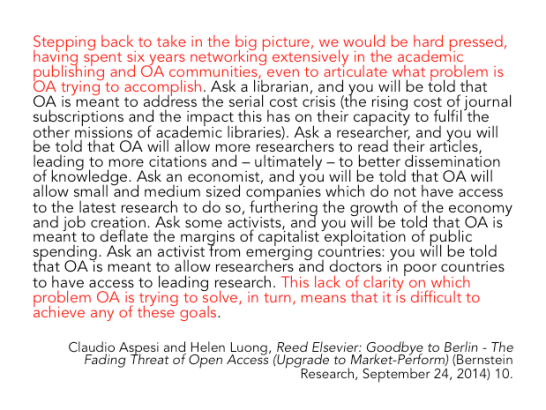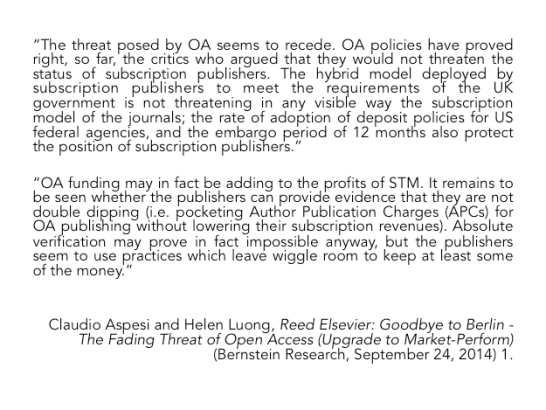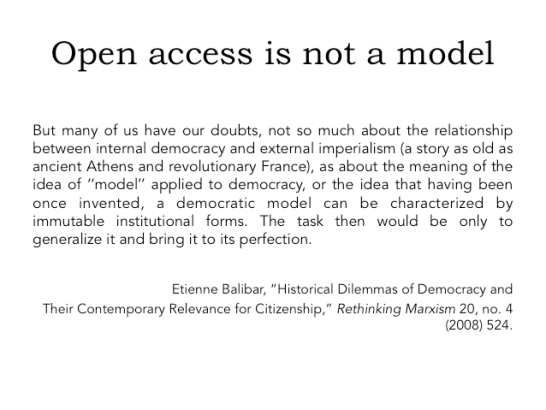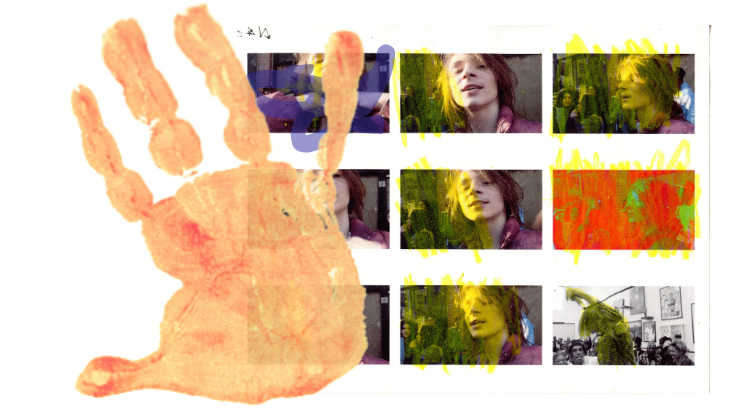 In the quest for greater access to scholarly work, the discussion has long been characterised as a search, for better or for worse, for the most sustainable model. In this transcript of her recent talk at the Post-Digital Scholar conference, Janneke Adema warns that framing the debate in terms of business models might actually lead to a watered-down version of open access. Here she explores the value of preserving the messiness, creativity and diversity of the movement.
In the quest for greater access to scholarly work, the discussion has long been characterised as a search, for better or for worse, for the most sustainable model. In this transcript of her recent talk at the Post-Digital Scholar conference, Janneke Adema warns that framing the debate in terms of business models might actually lead to a watered-down version of open access. Here she explores the value of preserving the messiness, creativity and diversity of the movement.
In Postmodernism and Popular Culture Angela McRobbie argues in favour of the messiness of cultural studies. As she states, originally cultural studies was characterized by intense internal theoretical conflict and disciplinary looseness. At the moment cultural studies began to gain institutional recognition, a, as McRobbie notes, ‘much purer and sometimes less colourful discipline emerged’. I want to make a plea here for open access to similarly retain its ‘messiness’, to stay ‘a contested terrain of study’, to remain something that inquires and that unsettles.
Messiness can be seen as having negative connotations, something that, as McRobbie points out with respect to the case of cultural studies, can lead to discourses of crisis, panic, and an erosion of belief. But it can also lead to forms of productive chaos. Where McRobbie states that ‘messiness is imperative for cultural studies to survive’, I would similarly say that messiness is essential for open access to endure. An essential aspect of open access has always been its theoretical and practical diversity and complexity, more positive connotations of what otherwise can be deemed ‘messy’. I want to emphasise the possibilities and potentials of messiness, and how in the case of open access this can lead to new forms of creativity and experimentation with the way we publish our research.
 Image credit: 13th Street Studio, Linda Frost (Creative Commons Attribution-Noncommercial-Share Alike 2.5 License)
Image credit: 13th Street Studio, Linda Frost (Creative Commons Attribution-Noncommercial-Share Alike 2.5 License)
There is however a strong impetus both within and outside the open access movement, to make open access less messy, to streamline it and to present a united front against critics: witness for instance the ongoing battle to follow a specific strategy (via for example the green or the gold route) to attain what is seen as the perceived goal of open access, universal free online access to scholarly research, in the quickest and most efficient way; or, look for example at the continuous search among publishers, governments and other ‘stakeholders’ for the sustainable open access business model. This has led to a situation were increasingly governments and publishers, in Europe for instance in the UK and the Netherlands, are putting all their marbles in one bowl, opting for what they see as the only truly sustainable strategy to attain the goal of universal accessibility: a gold route with an underlying business model of Article Processing Charges (APCs).
But as I want to argue here, implementing one specific model might lead to a watered-down version of open access becoming hegemonic and it will run the risk of open access becoming largely integrated into existing commercial and neoliberal publishing models. I therefore want to play the devil’s advocate here and explore a different vision of open access, one that doesn’t see open access as making publishing necessarily more sustainable, and neither sees it as a specific business model, nor as a clear-cut solution to the problem of accessibility. Rather it sees open access as a messy and contingent process, offering us a possibility to critically and creatively engage with scholarly publishing.
Open access will not make publishing sustainable
At the moment a large and eclectic combination of business and publishing models exists and is experimented with to publish research in open access. Hybrid models, institutional support, the depositing of preprints, freemium, apcs, library funding, crowd-sourcing, free labour gifting etc. What becomes clear for instance from research I conducted previously for OAPEN with respect to monograph publishing is that instead of relying on one single business model to publish open access books, almost all of the experiments I explored choose a pluralistic strategy whilst also depending on some kind of funding or institutional support. The search for the mythical ‘sustainable business model’ that needs to be found in order for open access to succeed or to fully be taken on board, is however ongoing.
 The question then is, what is a sustainable model? Especially with respect to the publishing of monographs in the humanities, the area I have done most research on, one could argue that it has never been sustainable in the sense of self-sustaining, as it has always relied on some form of additional external funding, as the market for these kinds of publications is just too small. So the likelihood of open access providing a single new sustainable publishing model (whatever that is) is similarly very slim. Funding and financing of open access will therefore most likely remain messy and will entail of a combination of approaches that build on how work has always been supported in the humanities. Nonetheless open access does offer us the opportunity to experiment with and explore new and different kinds of publishing and business models, such as scholar-led and library publishing, next to providing us with an opportunity to critique the ongoing commercialisation of publishing. Instead of supporting the interests of established stakeholders and keeping the system of scholarly communication as it has been functioning up to now in tact, open access provides us with a chance to critically and experimentally disrupt this system. For example by offering radical alternatives to the large, profit-led firms that have come to dominate the field of academic publishing, or by arguing for fair publication costs to become an integral part of research funding. But open access might also aid in shifting the discourse on the future of publishing from a focus on economics to a focus on the values and ethics underlying publishing that we would like to promote, emphasising care and process.
The question then is, what is a sustainable model? Especially with respect to the publishing of monographs in the humanities, the area I have done most research on, one could argue that it has never been sustainable in the sense of self-sustaining, as it has always relied on some form of additional external funding, as the market for these kinds of publications is just too small. So the likelihood of open access providing a single new sustainable publishing model (whatever that is) is similarly very slim. Funding and financing of open access will therefore most likely remain messy and will entail of a combination of approaches that build on how work has always been supported in the humanities. Nonetheless open access does offer us the opportunity to experiment with and explore new and different kinds of publishing and business models, such as scholar-led and library publishing, next to providing us with an opportunity to critique the ongoing commercialisation of publishing. Instead of supporting the interests of established stakeholders and keeping the system of scholarly communication as it has been functioning up to now in tact, open access provides us with a chance to critically and experimentally disrupt this system. For example by offering radical alternatives to the large, profit-led firms that have come to dominate the field of academic publishing, or by arguing for fair publication costs to become an integral part of research funding. But open access might also aid in shifting the discourse on the future of publishing from a focus on economics to a focus on the values and ethics underlying publishing that we would like to promote, emphasising care and process.
Open access is not a model
Related to the idea of sustainability is the idea of open access being a model that one can use to improve access. I would like to argue however, that it might be more helpful to think of open access less as a project and model to be implemented, and more as a process of continuous struggle and critical resistance. To draw an analogy with politics, Étienne Balibar argues that the problem with much of the discourse surrounding democracy is that it sees democracy as model that can be implemented in different contexts. If we conceptualise democracy in such a way however, there is a danger of it becoming a homogenizing force, masking differences and inequalities, as well as becoming a dominating force – yet another political regime that takes control and power. Balibar makes clear however that it might be more interesting and useful to focus on the process of the democratisation of democracy itself. Here democracy becomes a form of continuous struggle for democratisation, an ongoing process of critical self-reflection.
 In my opinion open access can and should be understood in similar terms: not as a homogeneous project striving to become a dominating model or force; not as a thing, an object, or a model with pre-described meaning or ideology, but as a project with an unknown outcome, as an ongoing series of critical struggles. One of the benefits of this vision would be that it would open up more space for radically different, messy, dissensual, critical and conflicting positions and perceptions on open access, where these different positions are often played down in the interests of strategy. This includes critical experiments with the form of the book and the way our system of scholarly communication currently operates.
In my opinion open access can and should be understood in similar terms: not as a homogeneous project striving to become a dominating model or force; not as a thing, an object, or a model with pre-described meaning or ideology, but as a project with an unknown outcome, as an ongoing series of critical struggles. One of the benefits of this vision would be that it would open up more space for radically different, messy, dissensual, critical and conflicting positions and perceptions on open access, where these different positions are often played down in the interests of strategy. This includes critical experiments with the form of the book and the way our system of scholarly communication currently operates.
Open access is not a solution to a specific problem
In a recent blog post linguist Curt Rice discusses a report by Bernstein Research entitled Goodbye to Berlin–The Fading Threat of Open Access, which analyses Elsevier’s value as a company. “The rise of open access,” the report states, “has inflicted little or no damage on the leading subscription publishers.”
 In his post, in line with the findings of the report, Rice argues that it is the lack of focus of the open access movement due to the multiple problems it is trying to solve as part of ‘its idealistic and anarchistic origins’ that is behind this fading threat. Rice argues there needs to be more leadership on which specific problem open access is meant to be solving.
In his post, in line with the findings of the report, Rice argues that it is the lack of focus of the open access movement due to the multiple problems it is trying to solve as part of ‘its idealistic and anarchistic origins’ that is behind this fading threat. Rice argues there needs to be more leadership on which specific problem open access is meant to be solving.
 However, if you take a look at the Bernstein report more closely, it becomes apparent that it is not the lack of consensus of the open access movement that has caused open access’ reduced ‘threat’, but the specific implementation of the gold APC model in Europe and the preference for a Green Route with a 12-month embargo in the US. Both these models can be seen to favour existing stakeholders, including commercial publishers. It is the implementation of these specific models that caused open access being less of a threat to Elsevier.
However, if you take a look at the Bernstein report more closely, it becomes apparent that it is not the lack of consensus of the open access movement that has caused open access’ reduced ‘threat’, but the specific implementation of the gold APC model in Europe and the preference for a Green Route with a 12-month embargo in the US. Both these models can be seen to favour existing stakeholders, including commercial publishers. It is the implementation of these specific models that caused open access being less of a threat to Elsevier.
 There is arguably no one problem or even main problem that open access is trying to address, as the motivations underlying open access are manifold. For instance, in forms of what we have called radical open access the focus is on combining achieving universal, free, online access to research with a rigorous critical exploration of the form of the book itself, examining its humanist underpinnings. Next to that there is an ongoing engagement with what might be considered more ‘experimental’ forms of research and publication, for which commercial and print-based publishing have hardly provided space. The situation open access is responding to is highly contextual and contingent and hence its responses are also changeable and complex. Open Access is therefore not a specific solution (for instance apcs) to a specific problem (for example access); rather I would see it as an ongoing processual and critical engagement with changes in the publishing system, in our scholarly communication practices and in our media and technologies of communication.
There is arguably no one problem or even main problem that open access is trying to address, as the motivations underlying open access are manifold. For instance, in forms of what we have called radical open access the focus is on combining achieving universal, free, online access to research with a rigorous critical exploration of the form of the book itself, examining its humanist underpinnings. Next to that there is an ongoing engagement with what might be considered more ‘experimental’ forms of research and publication, for which commercial and print-based publishing have hardly provided space. The situation open access is responding to is highly contextual and contingent and hence its responses are also changeable and complex. Open Access is therefore not a specific solution (for instance apcs) to a specific problem (for example access); rather I would see it as an ongoing processual and critical engagement with changes in the publishing system, in our scholarly communication practices and in our media and technologies of communication.
I would like to retain open access’ messiness, diversity and complexity, especially against the backdrop of the neoliberal implementation of open access. This is also very much a discursive struggle: gold is not the only model for open access, it is not even the dominant model, let alone the only sustainable model for open access publishing or dissemination, it is just the model that seems to be preferred by governments and commercial publishers. We need to emphasise the variety of discourses that exist on open access as well as its multifaceted history. The current implementation of open access offers us a clear chance, an opening to again formulate different futures or alternative visions for open access, in an ongoing manner.
Adema, Janneke. Open Access Business Models for Books in the Humanities and Social Sciences: An Overview of Initiatives and Experiments (OAPEN Project Report). Amsterdam, 2010.
Adema, Janneke, and Gary Hall. “The Political Nature of the Book: On Artists’ Books and Radical Open Access.” New Formations 78, no. 1 (2013): 138–56. doi:10.3898/NewF.78.07.2013.
Aspesi, Claudio, and Helen Luong. Reed Elsevier: Goodbye to Berlin – The Fading Threat of Open Access (Upgrade to Market-Perform). Bernstein Research, September 24, 2014.
Balibar, Etienne. “Historical Dilemmas of Democracy and Their Contemporary Relevance for Citizenship.” Rethinking Marxism 20, no. 4 (2008): 522–38. doi:10.1080/08935690802299363.
McRobbie, Angela, and Angela Mcrobbie. Postmodernism and Popular Culture. Routledge, 2003.
Rice, Curt. “One Big Problem with Open Access and Why the Best Way to Fix It Isn’t Going to Work.” Curt Rice – Science in Balance, September 30, 2014. http://curt-rice.com/2014/09/30/main-problem-open-access-best-way-fix-isnt-going-work/.
This originally appeared on Open Reflections and is reposted under Creative Commons license CC BY 3.0.
Note: This article gives the views of the author, and not the position of the Impact of Social Science blog, nor of the London School of Economics. Please review our Comments Policy if you have any concerns on posting a comment below.
Janneke Adema is a Research Fellow in Digital Media at Coventry University where she is writing a PhD thesis on the future of the scholarly monograph. She is the author of among others the OAPEN report Overview of Open Access Models for eBooks in the Humanities and Social Sciences (2010) and has published in New Formations; The International Journal of Cultural Studies, New Media & Society, New Review of Academic Librarianship; Krisis: Journal for Contemporary Philosophy; Scholarly and Research Communication; and LOGOS. Together with Pete Woodbridge she has co-edited a living book on Symbiosis (Open Humanities Press, 2011). Her research can be followed on http://www.openreflections.wordpress.com











3 Comments